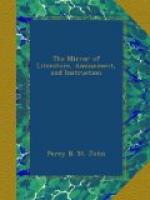[2] Stow’s “Survey,” p. 829, edit. 1618.
[3] Ibid. p. 130.
[4] Ibid.
[5] The church of St. Mary
le Strand was first termed St. Mary le
Strand
Cross; but, as the Protector Somerset, in the reign
of
Edward
VI. deprived the inhabitants of it, in order to afford
a
site for his intended palace (Somerset House), our
historians
have barely mentioned it, some of whom suppose it
to
have been alluded to in the decretal sentence of Stephen,
Archbishop
of Canterbury, 1222, already mentioned under the
name
of the Innocents. The parishioners, thus
deprived of
their
place of worship, were compelled to find admittance
at
the
neighbouring churches, till the commissioners for
erecting
fifty new ones determined this parish should contain
one
of the number.—Malcolm.
[6] Stow’s “Survey,” p. 130, edit. 1618.
[7] The old May-pole often
mentioned as in a state of decay in
various
publications, which stood almost on the site of the
present
church, was removed in 1713, and a new one erected
July
4, opposite Somerset House, which had two gilt balls
and
a
vane on the summit, decorated on rejoicing days with
flags
and
garlands.—When the second May-pole was taken
down, in
May,
1718, Sir Isaac Newton procured it from the inhabitants,
and
afterwards sent it to the Rev. Mr. Pound, rector of
Wanstead,
Essex, who obtained permission from Lord Castlemain
to
erect it in Wanstead Park, for the support of the then
largest
telescope in Europe, made by Monsieur Hugon, and
presented
by him to the Royal Society, of which he was a
member.
This enormous instrument, 125 feet in length, had not
long
remained in the park, when the following limping verses
were
affixed to the May-pole:
“Once I adorn’d
the Strand,
But now have found
My way to pound,
In Baron Newton’s land;
Where my aspiring head aloft is rear’d,
T’ observe the motions of the ethereal
herd.
“Here sometimes rais’d a machine by my side,
Through which is seen the sparkling milky tide:
Here oft I’m scented with a balmy dew,
A pleasing blessing which the Strand ne’er knew.
“There stood I only to receive abuse,
But here converted to a nobler use;
So that with me all passengers will say,
I’m better far than when the Pole of May.”
* * * * *
THE LAST WISH.
(For the Mirror.)
Edward Rose, who died at Barnes, bequeathed an annual amount of 20_l_. to the parish, on condition that rose-trees should be planted round his tomb.




